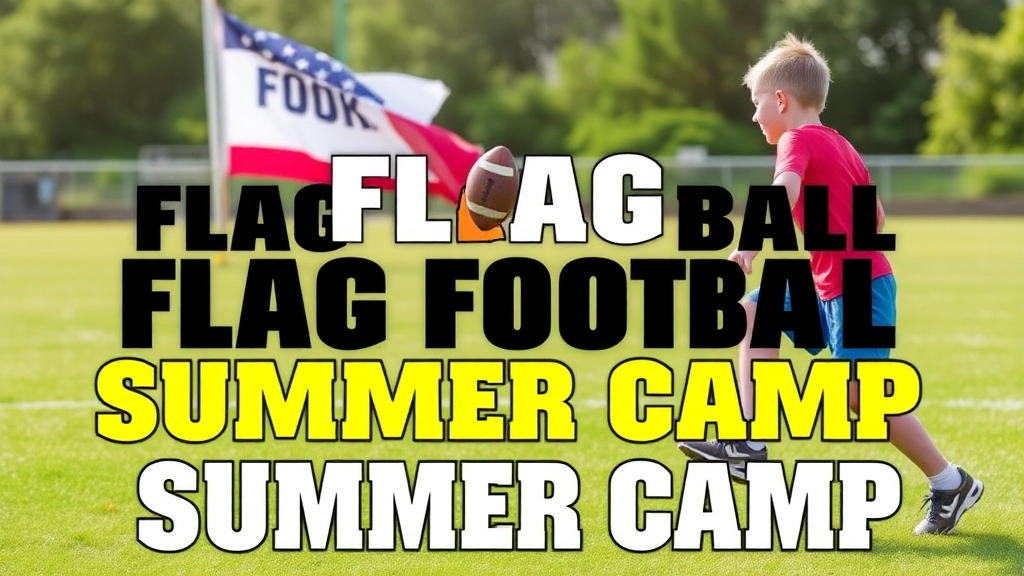Is a Flag Football Summer Camp Right for Your Child?
Ever wondered if a flag football summer camp is the right move for your child? Perhaps you’re concerned about safety or curious about the skills they’ll acquire. This article dives deep into the world of flag football camps, outlining their benefits, the skills developed, daily schedules, and the age groups they cater to. From safety measures to packing essentials, we cover everything you need to know to make an informed decision.
Benefits of Flag Football Summer Camps
Flag football summer camps offer a unique blend of fun, fitness, and skill-building. With professional coaching, structured schedules, and a focus on safety, these camps provide an ideal environment for young athletes. Whether your child is a beginner or an advanced player, there’s a camp tailored to their needs.
What to Expect
Read on to discover success stories, testimonials, and FAQs that will help you choose the perfect flag football summer camp for your child.
Overview of Flag Football Summer Camps
Ever wondered if a flag football summer camp is the right move for your kid? Maybe you’re worried about safety, or if they’ll actually learn something useful. Well, let me break it down for you in a way that’s easy to digest.
What Exactly is a Flag Football Summer Camp?
Imagine a place where kids and teens can spend their summer days playing flag football, making friends, and learning new skills. That’s a flag football summer camp in a nutshell. It’s not just about playing games; it’s a structured environment where they get coached by professionals, work on their fitness, and understand the game better.
Why Choose Flag Football Over Tackle Football?
- Safety First: Flag football is a non-contact sport, which means fewer injuries.
- Skill Development: It focuses on agility, speed, and strategy rather than brute force.
- Inclusivity: Suitable for all ages and skill levels, from beginners to advanced players.
Key Features of Flag Football Camps
Professional Coaching
At these camps, your kids get to learn from the best. Coaches usually have a background in either playing or coaching football, ensuring they pass on top-notch skills and techniques.
Structured Schedule
No more âMom, I’m bored!â during summer. These camps have a daily schedule packed with drills, games, and even some downtime for relaxation.
Fitness and Conditioning
It’s not just about playing games. Camps often include fitness routines to improve stamina, agility, and overall physical health.
Team Building
Your child will learn the importance of teamwork, leadership, and communication. These skills are not just useful on the field but in everyday life too.
Fun Activities
It’s summer, after all! Camps often include other fun activities like swimming, hiking, or even arts and crafts to keep things interesting.
Real Concerns, Real Answers
Is it Safe?
Absolutely. Camps follow strict safety protocols, including regular hydration breaks, proper warm-ups, and using the right equipment.
Will My Kid Enjoy It?
Most likely, yes. The mix of sports, fun, and friendships usually makes it a hit among kids.
Is it Worth the Investment?
Given the skills, fitness, and fun your child will gain, it’s typically worth every penny. Plus, the memories and friendships they make are priceless.
For more information on other exciting activities, check out our Top 10 Exciting Summer Camp Activities and if your child loves football, don’t miss our guide on Flag Football Skills, Gear, and Safety.
Benefits of Attending a Flag Football Summer Camp
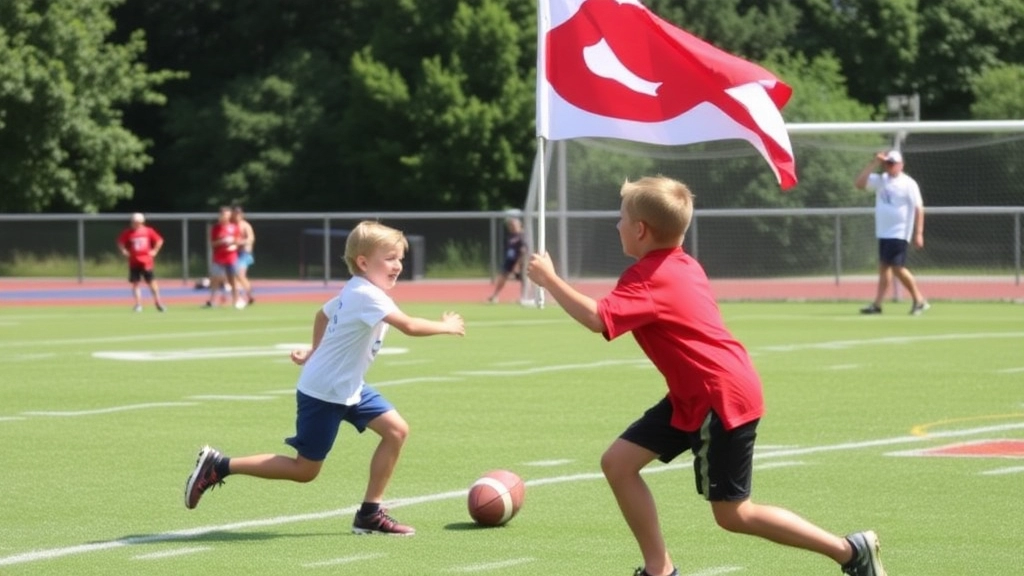
Ever wonder what makes flag football summer camps so popular?
Why should you even consider it?
Let’s break it down.
Why Flag Football Camps?
You might be thinking, “Isn’t it just another sport camp?”
Nope.
Flag football camps offer a unique mix of fun and skill-building.
Here’s why they’re worth your time:
- Fitness Boost: Get active, burn calories, and improve your fitness without the heavy contact.
- Skill Development: Learn the game’s nuances—like strategy, teamwork, and quick decision-making.
- Social Connections: Meet like-minded people. Make friends who share your passion.
- Confidence Building: Master new skills and see your self-esteem soar.
What Do You Get Out of It?
Let’s keep it real.
You’re not just running around for the sake of it.
- Teamwork: You’ll learn how to work with others, which is a life skill.
- Leadership: Take charge on the field, and it translates off the field too.
- Discipline: Stick to schedules, follow rules, and see how discipline pays off.
Not Just for Kids
Adults, listen up.
Flag football camps aren’t just for the youngsters.
They’re perfect for anyone who wants to relive those glory days or just stay active.
Real Stories
Like my mate Dave.
He joined a camp last summer.
Came back fitter, more confident, and with a bunch of new mates.
His words: “Best decision ever.”
Key Skills Developed at Flag Football Camps
Ever wondered what skills you can pick up at a flag football camp? You’re not alone. Many parents and young athletes ask, “Is it worth it?” and “What will I actually learn?” Let’s dive into the key skills you’ll develop at these camps.
Building Blocks of Flag Football
From the get-go, flag football camps focus on fundamental skills. These aren’t just the basics; they’re the bedrock of the game. Here’s what you’ll master:
- Agility and Speed: Quick footwork drills will have you dodging defenders like a pro.
- Hand-Eye Coordination: Catching drills ensure you don’t drop the ball when it counts.
- Teamwork and Communication: Learn to read the field and communicate effectively with teammates.
Advanced Techniques
Once you’ve nailed the basics, it’s time to level up with some advanced techniques. This is where the fun really starts:
- Route Running: Perfect your routes to confuse defenders and create openings.
- Defensive Strategies: Learn to anticipate plays and shut down the opposition.
- Quarterback Skills: Even if you’re not the QB, understanding their role can elevate your game.
Real-Life Examples
Let me tell you about Jamie, a camper who thought they’d never be able to catch anything more than a cold. After a week of focused drills, Jamie was snagging passes like a seasoned receiver. That’s the magic of these campsâturning doubts into skills.
Why These Skills Matter
You might be thinking, “Great, but why should I care?” Here’s the deal:
- Boosts Confidence: Mastering these skills makes you more confident on and off the field.
- Improves Fitness: You’re not just learning; you’re getting fit.
- Lays the Foundation for Future Success: Whether in sports or life, these skills are transferable.
If you’re interested in more activities that can boost your child’s skills and confidence, check out our Top Soccer Summer Camps for Kids and Teens. For younger children, our Ultimate Guide to Summer Camp for 3-Year-Olds offers great tips and insights.
Typical Daily Schedule at a Flag Football Camp
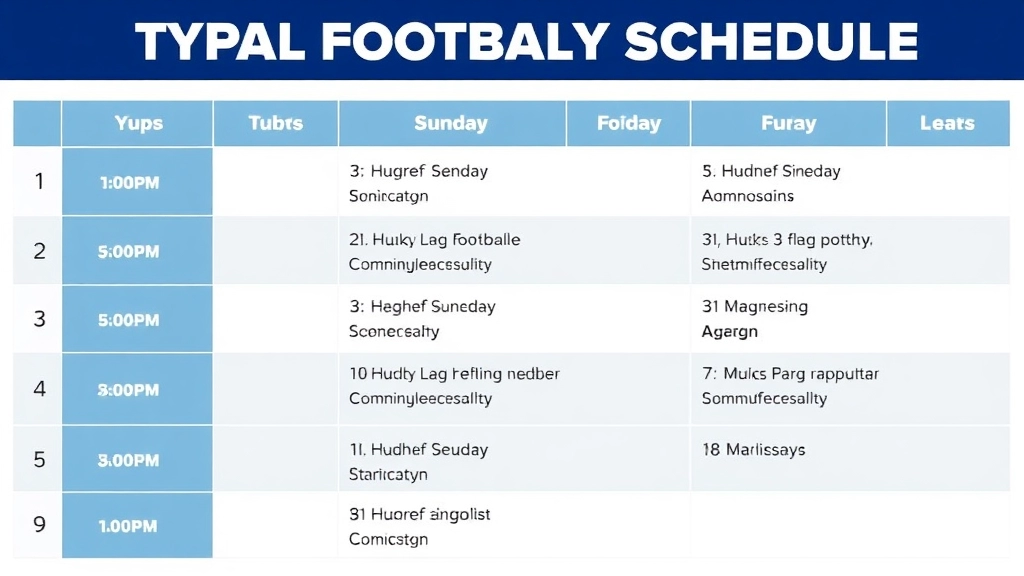
Ever wondered what a day at a flag football summer camp looks like?
You’re not alone.
Many parents and young athletes have the same question.
And let’s be real, knowing the schedule can make or break your decision to sign up.
So, let’s dive in.
Morning Kickoff: Warm-Up and Drills
Keyword: Flag Football Camp
First thing’s first, we start with warm-ups.
Think dynamic stretches, light jogging, and mobility exercises.
Why?
Because no one wants to pull a muscle before the fun even begins.
After warming up, it’s straight into skill drills.
Here’s what you can expect:
- Passing Drills: Perfect for quarterbacks and receivers.
- Catching Drills: Improve those hands.
- Route Running: Sharpen your cuts and turns.
- Defensive Techniques: Learn to read the offense.
Mid-Morning: Team Strategy and Playbooks
Next up, we dive into team strategy.
We break into smaller groups to focus on specific positions.
You’ll get hands-on with playbooks and learn the ins and outs of flag football strategies.
We’re talking:
- Offensive plays
- Defensive schemes
- Special teams tactics
Lunchtime: Refuel and Relax
By now, you’ve worked up an appetite.
Lunch is not just about eating; it’s a time to relax and socialise.
You’ll get to know your teammates better and maybe even pick up some tips from the coaches.
Early Afternoon: Scrimmage Time
Here’s where the fun ramps up.
Scrimmages take everything you’ve learned and put it into action.
You’ll play real games against other campers.
It’s competitive, but also a learning experience.
Coaches will stop play to offer advice and corrections.
Late Afternoon: Cool Down and Review
The day winds down with a cool-down session.
Think stretching, light jogging, and maybe some yoga.
After that, it’s time for a review session.
Coaches will go over what you did well and where you can improve.
You might even get some one-on-one time with a coach.
Evening: Optional Activities and Free Time
Some camps offer optional evening activities.
These could be:
- Movie nights
- Team-building exercises
- Guest speakers
Or, you could just chill out and get ready for the next day.
Wrapping Up
So, there you have it.
A typical day at a flag football camp is packed with activities designed to improve your skills and knowledge of the game.
Whether you’re a rookie or a seasoned player, there’s always something to learn.
And trust me, you’ll leave camp a better player than when you arrived.
Ready to sign up?
Check out our list of recommended flag football camps to find the perfect fit for you.
Got more questions?
Head over to our FAQ section for all the answers.
Age Groups and Skill Levels Catered to at Camps
Alright, let’s dive into the nitty-gritty of age groups and skill levels at flag football summer camps. You might be wondering, “Is this camp right for my kid?” or “Will I fit in with my level of experience?” Here’s the lowdown to ease those worries.
Age Groups: From Tykes to Teens
Flag football camps are typically designed to cater to a broad range of age groups. Whether you’ve got a little one just starting out or a teenager looking to refine their skills, there’s a spot for everyone. Here’s a quick breakdown:
- 5-7 Years Old: The focus here is on introducing the basics of the game in a fun and engaging way. Think of it as playtime with a purpose.
- 8-10 Years Old: At this stage, kids start to learn more structured gameplay and basic strategies. It’s a mix of fun and a bit more seriousness.
- 11-13 Years Old: Pre-teens get into more advanced techniques and strategies. The drills get tougher, and the games get more competitive.
- 14-17 Years Old: For the teens, it’s all about honing skills, understanding complex plays, and even some conditioning. This is where future stars are made.
Skill Levels: From Rookies to Pros
Flag football camps aren’t just for beginners. They cater to all skill levels. Here’s how they break it down:
- Beginner: Never played before? No worries. Camps for beginners focus on the basicsâhow to hold the ball, basic rules, and simple plays.
- Intermediate: If you’ve got some experience and know your way around the field, intermediate camps will help you step up your game. Expect more drills, more plays, and a bit of strategy.
- Advanced: For those who’ve been playing for a while and are looking to perfect their skills, advanced camps are where it’s at. These camps dive deep into complex plays, advanced techniques, and serious conditioning.
Mixing It Up
What’s great about these camps is the flexibility. They often mix age groups and skill levels for certain activities, creating a dynamic learning environment. Younger kids get inspired by the older ones, and the more experienced players get to mentor the newbies.
Real Talk: Finding Your Fit
When choosing a camp, it’s crucial to find one that fits your age and skill level. Here’s a quick checklist to help you out:
- Check the Camp’s Website: Most camps list their age groups and skill levels clearly.
- Reach Out: Don’t hesitate to contact the camp organisers. They can give you a better idea of where you or your child might fit in.
- Trial Sessions: Some camps offer trial sessions or assessments. This can be a great way to gauge if the camp is the right fit.
Remember, the goal is to find a camp where you or your child will be challenged but not overwhelmed. It’s all about growth, learning, and having a blast while doing it.
Got more questions? Check out our Ultimate Guide to Kids’ Summer Camps for answers to common queries. And if you’re looking for a unique camp experience, don’t miss our Zoo Summer Camp for a mix of fun, learning, and adventure.
How to Choose the Right Flag Football Summer Camp
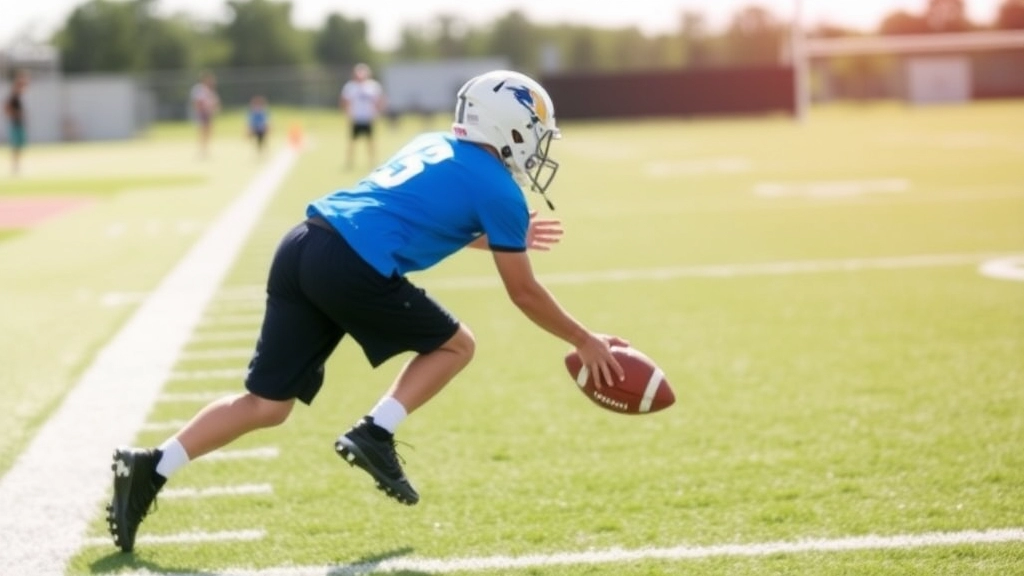
Alright, so you’re thinking about flag football summer camps, huh?
Great choice!
But how do you pick the right one?
Let’s break it down.
What Are Your Goals?
First off, ask yourself:
What do you want to get out of this camp?
- Skill Development: Are you looking to boost specific skills like passing, catching, or strategy?
- Fitness: Is getting in shape a priority?
- Social: Want to make new friends who love football as much as you do?
Knowing your goals helps you narrow down your options.
Check the Coaches
Who’s running the show?
- Experience: Look for camps with experienced coaches. Former players or professional coaches are a big plus.
- Credentials: Certifications and a solid track record matter.
Good coaching can make or break your experience.
Age Groups and Skill Levels
Not all camps are created equal.
Some cater to beginners; others are for advanced players.
- Age Range: Make sure the camp is appropriate for your age.
- Skill Level: Choose a camp that matches your current skill level. If you’re a newbie, don’t jump into an advanced camp.
Location and Schedule
Convenience matters.
- Proximity: How far is the camp from home? Consider travel time.
- Dates: Check the camp dates and see if they fit your summer plans.
Safety First
Safety is non-negotiable.
- Protocols: What safety measures are in place? Look for camps that follow strict safety guidelines.
- First Aid: Is there medical staff on-site? This is crucial.
Reviews and Testimonials
What are others saying?
- Feedback: Look for reviews and testimonials from past attendees.
- Success Stories: Positive experiences can give you a good idea of what to expect.
Cost and Value
What’s the damage?
- Fees: Compare the cost of different camps.
- What’s Included: Check what’s included in the fee. Meals? Equipment? Extra activities?
Sometimes spending a bit more gets you a lot more value.
Extras
Any cool perks?
- Special Guests: Some camps bring in guest speakers or professional players.
- Facilities: Good facilities can enhance your experience.
Safety Measures and Protocols at Flag Football Camps
Ever wondered if your kid is safe at a flag football summer camp? Yeah, I get it. Safety is a top priority for any parent. You’re not just sending your child off to have fun; you want to make sure they come back in one piece. So, let’s dive into the nitty-gritty of safety measures and protocols at flag football camps.
Why Safety Matters
First off, let’s address the elephant in the room: injuries. No one wants their kid sidelined with a sprain or worse. That’s why camps go the extra mile to make sure everyone stays safe. Here’s what they do:
- Certified Coaches: Camps don’t just hire anyone. They bring in certified coaches who know their stuff. These folks are trained in first aid and CPR, so they can handle any minor injuries on the spot.
- Proper Gear: Helmets, mouthguards, and proper footwear are non-negotiables. The right gear can make a world of difference in preventing injuries.
- Hydration Stations: Dehydration is a real concern, especially in the summer heat. Camps set up multiple hydration stations to keep the kids well-hydrated.
Daily Safety Protocols
Every day at camp starts with a safety briefing. Here’s what that typically includes:
- Warm-Ups and Cool-Downs: These aren’t just for show. Proper warm-ups and cool-downs help prevent muscle strains and other injuries.
- Buddy System: Kids are paired up to look out for each other. It’s a simple yet effective way to ensure no one gets lost or left behind.
- Emergency Plans: Camps have detailed emergency plans in place. Whether it’s a sudden storm or an unexpected injury, they’re prepared for it all.
Real Stories, Real Safety
Take Tim, a 12-year-old who attended a flag football camp last summer. He tripped and fell during a game. Thanks to the quick response of the certified coaches and the first aid protocols in place, he was back on his feet in no time, with just a minor scrape to show for it.
How Camps Are Adapting
In today’s world, camps are also adapting to new health guidelines. Here’s what they’re doing:
- Sanitisation: Regular sanitisation of equipment and common areas is a must.
- Health Screenings: Daily health checks are performed to ensure no one is showing symptoms of illness.
- Social Distancing: Even in a team sport, there are ways to maintain safe distances, especially during drills and non-contact activities.
What You Can Do
As a parent, you can also take steps to ensure your child’s safety:
- Pack Essentials: Make sure your child has all the necessary gear, including a personal water bottle, sunscreen, and any required medications.
- Stay Informed: Keep in touch with camp organisers and stay updated on any new safety protocols.
The Bottom Line
Safety isn’t just a buzzword at flag football camps; it’s a core principle. From certified coaches to daily safety briefings and emergency plans, every measure is taken to ensure your child has a fun and safe experience. So, when you’re choosing a camp, make sure to ask about their safety protocols. It’s peace of mind you can’t put a price on.
For more insights on ensuring a safe and enjoyable camp experience, check out our guide on essential guidelines for safety at summer camps. Additionally, explore the top summer camps for teens to find the best fit for your child.
What to Pack for a Flag Football Summer Camp
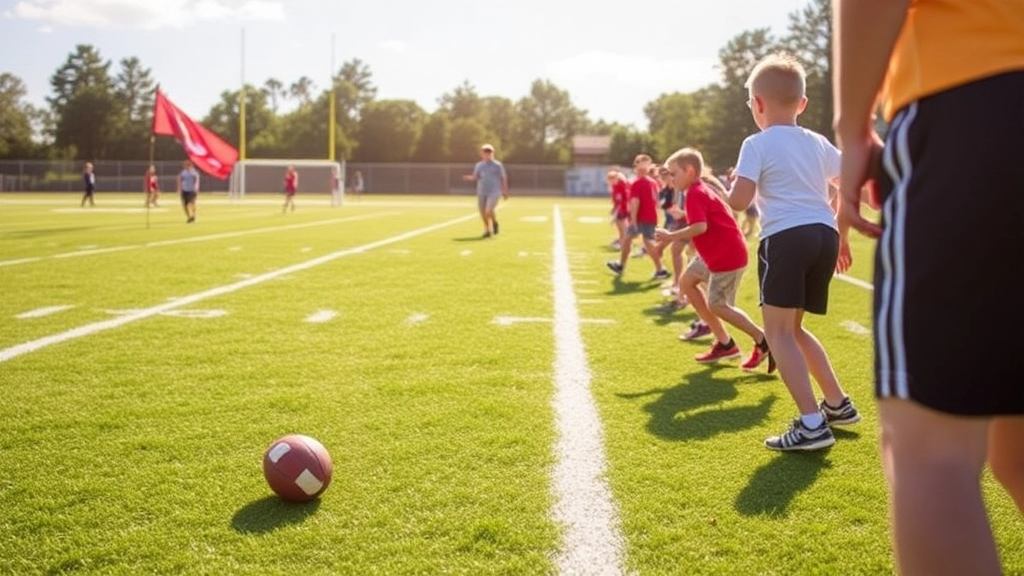
Ever wondered what to pack for a flag football summer camp?
Let’s break it down.
You don’t want to be that person who shows up unprepared.
So, here’s your ultimate packing guide.
Essential Gear
- Flag Belt: You can’t play without it.
- Football Boots: Make sure they’re comfortable and broken in.
- Athletic Wear: Breathable shorts and t-shirts.
- Socks: Pack extra. Trust me, you’ll need them.
- Water Bottle: Hydration is key.
- Gloves: Not a must, but they help with grip.
Personal Items
- Sunscreen: You’ll be outdoors a lot.
- Hat: Keeps the sun out of your eyes.
- Towel: For those sweaty moments.
- Snacks: Energy bars, nuts, and fruits.
- Personal Hygiene Items: Toothbrush, toothpaste, deodorant.
- First Aid Kit: Just in case.
Optional but Useful
- Notebook and Pen: For jotting down plays and tips.
- Camera or Phone: Capture those epic moments.
- Backup Gear: Extra flag belt, socks, and gloves.
Real Talk
You may think you need a ton of stuff, but keep it simple.
The essentials will get you through.
Remember, you’re there to play and have fun, not lug around a suitcase.
Packing Checklist
- Flag Belt
- Football Boots
- Athletic Wear
- Extra Socks
- Water Bottle
- Gloves
- Sunscreen
- Hat
- Towel
- Snacks
- Personal Hygiene Items
- First Aid Kit
- Notebook and Pen (optional)
- Camera or Phone (optional)
- Backup Gear (optional)
Final Thoughts
Packing right can make or break your camp experience.
So, stick to this list and you’ll be golden.
Got more questions? Check out our FAQs about Flag Football Summer Camps.
Success Stories and Testimonials from Camp Attendees
Ever wonder if flag football summer camps are worth it? Let’s dive into some real-life stories and testimonials from those who’ve been there, done that, and scored big!
Transforming Skills and Confidence
“I was always the kid who sat on the sidelines,” says Jake, a 12-year-old who attended his first flag football camp last summer. “But after just one week, I was not only playing but leading my team!” Jake’s story is a testament to how these camps can boost both skills and confidence. He went from being shy and hesitant to becoming a team leader, all thanks to the supportive environment and expert coaching at the camp.
Making Lifelong Friends
Emily, a 14-year-old camper, shares, “I was nervous about not knowing anyone, but by the end of the first day, I had already made a bunch of friends.” Camps are not just about football; they’re about community. The shared experiences, teamwork, and fun activities help kids form bonds that often last beyond the camp itself.
From Beginner to Pro
“I had zero experience with flag football,” admits Max, a 10-year-old who joined a camp last year. “But the coaches were amazing. They broke everything down into simple steps, and by the end of the camp, I felt like a pro.” Max’s transformation showcases how even complete beginners can quickly pick up the game and develop a love for it.
Parental Peace of Mind
Parents also have glowing reviews. “I was worried about safety and whether my son would fit in,” says Sarah, Jake’s mum. “But the camp’s safety measures were top-notch, and the staff made sure every child felt included.” Knowing that their children are in a safe, nurturing environment allows parents to relax and enjoy the summer too.
Building Future Stars
Then there’s the story of Alex, who attended a flag football camp five years ago. “That camp was the turning point for me,” he recalls. “It ignited my passion for football, and now I’m playing at a competitive level.” Alex’s journey from a summer camp newbie to a competitive player highlights the long-term impact these camps can have on a young athlete’s career.
Why These Stories Matter
These success stories and testimonials are not just feel-good tales; they’re real examples of how flag football summer camps can make a significant difference. They show how these camps:
- Boost Confidence: Kids like Jake go from the sidelines to leading teams.
- Foster Friendships: Emily’s experience proves that camps are great for socialising.
- Teach New Skills: Max’s story shows that even beginners can become proficient.
- Provide Peace of Mind: Parents like Sarah appreciate the safety and inclusivity.
- Inspire Future Athletes: Alex’s journey highlights the long-term benefits.
For more information on similar camps that offer a blend of fun and skill-building activities, check out our JCC Summer Camps and Woodward Summer Camp pages.
Frequently Asked Questions About Flag Football Summer Camps
Alright, let’s dive into the nitty-gritty of Flag Football Summer Camps. I know you’ve got questions, and I’m here to give you the lowdown.
What age groups do these camps cater to?
Camps usually cater to a wide range of age groups, from young kids to teens. Typically, you’ll find:
- 5-7 years: Just starting out, basic skills.
- 8-10 years: Building on fundamentals.
- 11-13 years: Getting competitive.
- 14-17 years: Advanced skills and strategy.
Do I need any previous experience?
Nope. Most camps are designed for all skill levels. Whether you’re a newbie or a seasoned player, there’s something for everyone.
What’s a typical day like at camp?
Expect a mix of drills, games, and fun activities. Here’s a quick breakdown:
- Morning: Warm-ups and skill drills.
- Midday: Strategy sessions and lunch.
- Afternoon: Scrimmages and team-building exercises.
- Evening: Cool-down and review.
How do I choose the right camp?
Here’s a quick checklist:
- Location: Close to home or worth the travel? Check out these top picks and tips for summer camps in San Antonio.
- Coaches: Experienced and reputable?
- Facilities: Top-notch or just okay?
- Reviews: What are others saying?
What about safety?
Safety is a big deal. Look for:
- Certified coaches
- First-aid trained staff
- Proper equipment
- Strict protocols
What should I pack?
Keep it simple:
- Athletic gear
- Water bottle
- Sunscreen
- Snacks
- Change of clothes
Any success stories?
Tons. Kids who’ve attended these camps often come back more confident, skilled, and ready to take on new challenges. For more insights, you can read about the top benefits of church summer camps.
How much does it cost?
Prices vary. You’re looking at anywhere from £100 to £500, depending on the camp’s duration and facilities.
Can parents visit?
Most camps have specific visiting hours. Check with the camp beforehand.
How do I register?
Usually, you can sign up online. Just visit the camp’s website, fill out the form, and you’re good to go.
Frequently Asked Questions about Flag Football Summer Camps
What are the main benefits of attending a flag football summer camp?
Attending a flag football summer camp offers numerous benefits such as a fitness boost, skill development, social connections, and confidence building. You’ll also learn life skills like teamwork, leadership, and discipline.
What does a typical day at a flag football summer camp look like?
A typical day includes morning warm-ups and drills, team strategy sessions, lunchtime for refueling and socializing, afternoon scrimmages, cool-down and review sessions, and optional evening activities like movie nights or team-building exercises.
Are flag football camps only for kids?
No, flag football camps are not just for kids. Adults can also join to stay active, relive their glory days, or simply enjoy the game.
How do I choose the right flag football summer camp?
Consider your goals, check the coaches’ experience and credentials, ensure the camp caters to your age group and skill level, assess the location and schedule, prioritize safety, read reviews and testimonials, and compare costs and value.
What should I pack for a flag football summer camp?
Essential items include a flag belt, football boots, athletic wear, extra socks, a water bottle, and gloves. Don’t forget personal items like sunscreen, a hat, a towel, snacks, and personal hygiene items. Optional but useful items include a notebook and pen, a camera or phone, and backup gear.
What safety measures do flag football camps typically have in place?
Reputable camps follow strict safety protocols and usually have medical staff on-site. They also ensure that all activities are supervised by experienced coaches to minimize risks.
Can I find camps that offer special perks or activities?
Yes, some camps offer special perks like guest speakers, professional player appearances, and additional activities such as team-building exercises and movie nights. Good facilities can also enhance your overall experience.
How can I find reviews and testimonials about flag football camps?
Look for feedback on the camp’s website, social media pages, and review platforms. Positive experiences from past attendees can give you a good idea of what to expect.
What are the costs associated with flag football summer camps?
Costs can vary widely depending on the camp. Compare fees and check what’s included, such as meals, equipment, and extra activities. Sometimes spending a bit more can provide significantly more value.
Are there camps for different skill levels?
Yes, there are camps designed for various skill levels, from beginners to advanced players. Make sure to choose a camp that matches your current skill level to get the most out of the experience.
What should I do if I have more questions?
If you have more questions, check out our detailed articles or reach out to the camp organizers for specific information. You can also visit our FAQs section for more answers.
References
-
Benefits of Flag Football for Kids
-
5 Reasons Your Child Should Play Flag Football
-
Why Choose Flag Football?

